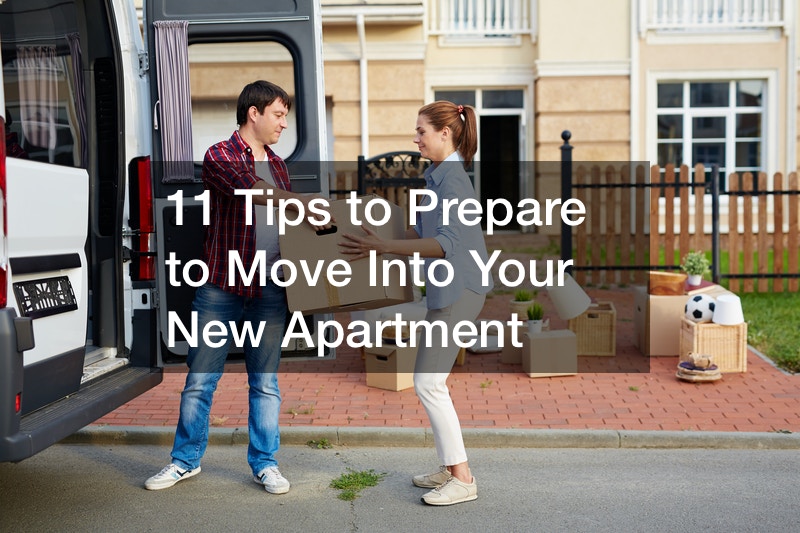
Moving into a new apartment, whether from your parent’s home, from college, or to a new city is always exciting! It can also be a bit stressful, especially if you’re not used to moving or have never had to pack or hire movers to take all your belongings, talk to landlords, or set up utilities. Fortunately, you can follow these tips below to prepare to move into your new apartment and stay stress-free while doing so!

1. Pack in a Way That Makes Unpacking Easy
With all the excitement of moving, it can be easy to forget that you will, eventually, have to unpack all the items you put into your moving boxes and your trunk haphazardly. Instead of stressing later on about how to remove all your belongings and unpack, prepare to move into your new apartment by packing in a way that makes unpacking later on easy.
For instance, if you have tons of dishes in your kitchen cabinets, it’s never a good idea to throw them in a box and be done with it. Make sure to use bubble wrap, wrap your fragile items in paper, and pack them neatly so they stay protected during the move and are easy to unpack later on.
You can also pack up clothes by rolling them instead of folding them. Not only does this make them easier to recognize and unpack later on, but it also saves you tons of storage space.
2. Get Ready to Decorate
Preparations and unpacking aside, once you get to your new apartment you’ll want to begin decorating ASAP. Decorating your home can not only help you get some much-needed stress relief, but it can also turn your place from stark and cold, to warm and inviting. Some simple decorations you can have on-hand include personal pictures, artwork, and curtains for your windows.
Some decorative items can also add a touch of personality while also being functional. For instance, bring a shower curtain with you to not only protect your bathroom against wet floors, but also help you spruce up your bathroom and add a splash of color. Window shades are also a beautiful addition to any apartment bedroom or living room. Window shades are both decorative and functional, as they help maintain your privacy.

3. Get Your New Key
Once you move in to your new apartment, you will be provided with your own set of keys to your apartment, including a garage key, your front door key, and a gate key if there is one. To prepare to move into your new apartment, it’s best to visit a locksmith and get a copy of your keys as soon as you are able — just make sure you’re allowed to do this under your contract with your landlord or ask for permission!
Having an extra set of keys can save you the headache and stress of having to find some new keys in case you lose them. It’s always a good idea to keep one set of keys in your apartment and one on you. You can also put a set of keys in your car. However, this does make them prone to theft if your vehicle is stolen.
If you do end up locking yourself out of your home even with a new set of keys, don’t worry because your landlord will usually call a locksmith who will be able to allow you back inside of your apartment. Keep in mind, however, if you do lose your keys, your landlord might want to replace the locks on your apartment door, which you might have to pay out of pocket. It’s best to just have extra keys on you for safe-keeping.
4. Plan for Utility Payments
Although you won’t have to pay for maintenance costs associated with having a home, such as HVAC repairs, roofing repairs, or cracks in your apartment’s exterior, you will have to pay monthly for utility payments when living in an apartment. Some landlords offer to bundle the utility payments with your rent payment, so it might seem as if you have no utility payments, but this does not mean you have free utilities.
On the contrary, you are still responsible for paying utility expenses such as water, electricity, gas, and heat. Before you move into your apartment, you’ll have to call your local city’s utility services agency to have these expenses put into your name and turned on. Many times, you won’t be able to have functioning electricity, water, or heat without a deposit on these services.
It’s best to prepare to move into your new apartment by having a little extra cash on hand to help you pay for your first couple months’ worth of utilities. It’s also a good idea to think of ways in which you can save on your monthly expenses.
One of the best ways you can save on energy costs, for instance, is to ask your landlord for home insulation in your apartment. Installing insulation, or at least updating it, can help keep your apartment cool in the summer and warm in the winter. This means you won’t have to shell out extra cash to use your AC unit or your heater!

5. Take Necessary Precautions
Another expense you might not have thought about is insurance coverage for your apartment. Most landlords have a clause in their lease agreement that states the tenant must have insurance coverage to protect the apartment against flooding, fires, and even earthquakes in states such as California.
Fortunately, insurance coverage for your home isn’t too expensive, averaging around $15 to $25 per month depending on your area. This is a small investment considering how helpful insurance can be, and how much it can help you if there is an emergency disaster. Although it might not be required, you can also get insurance to protect you against theft or vandalism. Even apartments located within closed buildings or gated communities might be susceptible to theft and robbery.
If you know you have valuables in your apartment, such as jewelry, paintings, or cash, it’s best to get these items insured separately as well. This protects you in case these items are specifically targeted and stolen. One of the best ways to prepare to move into your new apartment is to reach out to insurance agencies beforehand for quotes on pricing. Once you’ve found the most affordable option with your landlord’s minimum deductible, choose this plan.
6. Know What Your Landlord Will Do for You
As we mentioned before, your landlord might recommend you pay certain utilities on your own, or bundle them into your rent payment. Landlords are also flexible when it comes to what services they will provide for you. When your landlord provides you with a leasing agreement, make sure to read it thoroughly and ask for copies. This will ensure that you know exactly what services your landlord will do for you, or any circumstances that might require you to pay out of pocket.
For instance, your landlord might pay for pest control unless you’re found to be at fault for a bed bug infestation (this is also why many leases require you to stay away from used furniture). Other landlords will cover air conditioning services in your apartment unless the unit is physically damaged on your behalf.
Fortunately, many landlords can be flexible when it comes to paying for services, such as electric service, if it’s deemed a necessity and if it’s a hazard to leave it unrepaired. If you do have to pay for repair services, ask your landlord if you can pay for these services in payments through your next couple of rent checks.

7. Know What You’ll Have to Do Yourself
When it comes time to prepare to move into your new apartment, you’ll want to make sure you know exactly what expenses you’ll have to take care of on your own. If you’re unsure, ask your landlord for specifics.
Generally, however, you will have to take care of utility expenses such as electricity, water, and heat, and also internet. Internet service providers also vary depending on the area you are in, and you will have to call them on your own to set up an installation appointment.
On the other hand, your landlord usually covers waste removal services for you and the rest of the apartment complex. Always double check to make sure you’re not paying extra for this service, or paying double. Besides paying for expenses, you might also have to do small home maintenance yourself. This includes cleaning out your garbage disposal, doing small touch-up paint jobs, and cleaning out your garage or parking space if it comes with your apartment.
8. Know Who to Call for Help
If you’re ever in an emergency situation, such as experiencing a severe leak or flooding, or even smell gas coming from your kitchen, you should have a list of numbers on hand to provide emergency services for your apartment. Although your landlord can be a great resource, they are not always available to come take a look at your apartment. Some landlords might also live away from the apartment structure, meaning you’re on your own when it comes to emergencies.
To prepare to move into your new apartment, ask your landlord ahead of time for a list of numbers for emergency plumbing, emergency electrical services, or even emergency pest control services. Keep this list of numbers in a safe area that’s easy to access, such as your fridge door or on your nightstand.

9. Prepare to Keep Your Apartment Clean
You’ll want to prepare to move into your new apartment by cleaning it and keeping it clean during your time there. All landlords require you to leave the apartment looking exactly the same way as when you moved in. This means not leaving any holes in the wall from hanging picture frames, damaged floors, dirty windows, or stained carpets.
In order to keep your apartment clean, invest in a few household cleaning supplies before you move in. Some of these can include carpet cleaning solution, hardwood floor cleaners, mops, brooms and dustpans, and a small vacuum to fit into your apartment. Having these cleaning supplies on hand can help keep your apartment clean and ensure you get your full security deposit back when you move out again.
10. Make Sure to Modify Only What You’re Allowed
If you just moved into your new apartment and want to paint the walls, plant a garden, or do other renovations, check with your landlord first to see if these modifications are allowed. Many landlords will give you permission to paint walls, for instance, so long as the paint is lead-free and eco-friendly.
Other landlords might say no, or might not even allow you to make small modifications, such as installing a wall-mounted TV. When in doubt, check first with your landlord.
11. Explore Your New City!
One of the best and most fun ways to prepare to move into your new apartment is to explore your new city beforehand. Depending on where your apartment is located, there can be lots of fun things to do, including going out to restaurants, cafes, and pubs. Don’t get caught up in the stress of the move, and make sure you devote a little bit of time to exploring your new city.
If you have the opportunity, look around your new city beforehand so you can have a better idea of where amenities are located, such as your local gas station or dry cleaners. Remember, this is your new home now, so get out there and explore!
Moving can be a bit stressful, and it can be a bit daunting if you’re just moving out from your college dorm or your parent’s home. Fortunately, you can take simple steps to prepare to move into your new apartment, and ensure you’re doing everything you can to be a responsible tenant. The most important thing is to enjoy your newfound freedom in your new apartment!


